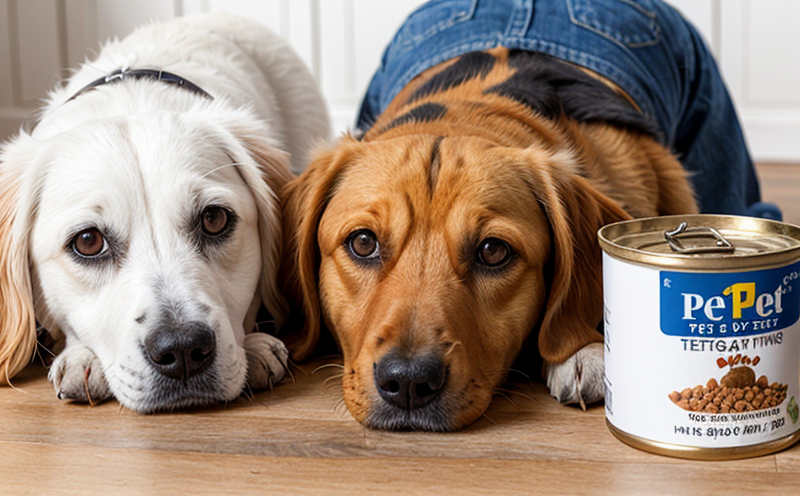ISO 69211 Chromium Detection in Pet Diets
The detection and analysis of chromium in pet diets is crucial not only for ensuring compliance with international standards but also for safeguarding the health and well-being of pets. ISO 69211 specifically addresses the quantification of total chromium, including both hexavalent (Cr(VI)) and trivalent (Cr(III)) forms, which are found in pet foods. This standard is essential in assessing potential risks to pets from dietary exposure to chromium compounds.
Chromium can be inadvertently introduced into pet food during manufacturing processes or through contamination of raw materials. Both hexavalent and trivalent chromium have different health implications for animals. Hexavalent chromium, particularly, has been linked to toxicity in dogs and cats, leading to concerns about its presence in pet diets.
The process of ISO 69211 involves several critical steps: sample preparation, digestion, and subsequent instrumental analysis using techniques such as Inductively Coupled Plasma Mass Spectrometry (ICP-MS). This method ensures accurate quantification of chromium levels. The results are reported in units of parts per million (ppm), providing stakeholders with clear data for decision-making.
For quality managers and compliance officers, this service provides a robust framework to ensure that pet food products meet stringent safety standards. For R&D engineers, it offers insights into the potential impacts of chromium on pet health, facilitating safer product development. And for procurement professionals, it ensures reliable sourcing of raw materials free from harmful contaminants.
| Standard Number | Title | Purpose |
|---|---|---|
| ISO 69211 | Determination of total chromium in pet diets by inductively coupled plasma mass spectrometry (ICP-MS) | To provide a method for the accurate quantification of total chromium, including hexavalent and trivalent forms, in pet foods. |
Applied Standards
The primary standard used in this service is ISO 69211. This international standard specifies a method for the determination of total chromium, including both hexavalent and trivalent forms, in pet diets using Inductively Coupled Plasma Mass Spectrometry (ICP-MS). The standard ensures consistent and accurate results across different laboratories.
| Standard Number | Title | Purpose |
|---|---|---|
| ISO 69211 | Determination of total chromium in pet diets by inductively coupled plasma mass spectrometry (ICP-MS) | To provide a method for the accurate quantification of total chromium, including hexavalent and trivalent forms, in pet foods. |
International Acceptance and Recognition
The ISO 69211 standard is widely recognized and accepted by regulatory bodies around the world. Its adoption ensures that pet food manufacturers are adhering to global best practices for chromium detection, which enhances consumer confidence in the safety of products.
International acceptance extends beyond mere compliance; it also promotes a consistent approach across different regions, making it easier for companies to export their products internationally without facing discrepancies in testing methods. This standardization is crucial for maintaining quality and safety standards globally.
The use of ISO 69211 by laboratories ensures that the results are reliable and reproducible, which is essential for regulatory compliance and consumer trust. It provides a level playing field for manufacturers to demonstrate their commitment to pet health and safety.
Competitive Advantage and Market Impact
The implementation of ISO 69211 Chromium Detection in Pet Diets can provide significant competitive advantages. By ensuring that pet foods meet the stringent requirements set by this standard, companies can differentiate themselves from competitors who may not adhere to such rigorous testing protocols.
Consumers are increasingly aware of the importance of safe and healthy pet food products. A company’s commitment to ISO 69211 can be a key differentiator in attracting health-conscious consumers. It also facilitates easier compliance with local regulations, which is particularly important for international brands looking to expand their market reach.
In terms of market impact, companies that consistently meet or exceed the standards set by ISO 69211 are likely to see increased brand loyalty and trust among pet owners. This can translate into higher sales and greater customer satisfaction, ultimately contributing to long-term growth and success in the industry.





